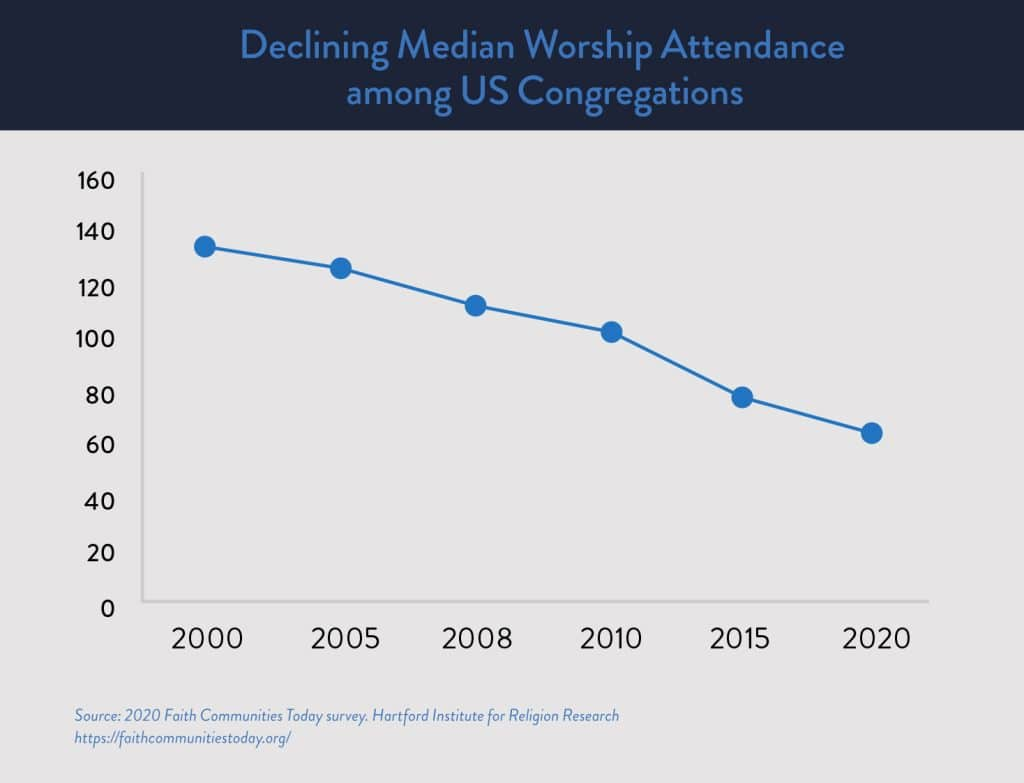It’s that magical time of the year again when people reflect on the last 12 months. Using those lessons learned, they then carve out those new year’s resolutions.
As a faith leader, you can take this time to look back on 2023 for your church. Did you grow in membership? Were there unique obstacles you were able to overcome? Where do you feel your ministry fell short?
Using the answers to those probing questions, you can begin to explore setting church goals and objectives for 2024. First, you’ll want to grade your own paper, so to speak, giving yourself gold stars for what your church did well and checking off those areas that might need improvement.
Setting church goals for 2024 will require some in-depth thought, a review of the metrics, and probably a little prayer. Your new goals should be realistic, with a clear path to reach them. Additionally, each new goal achieved should propel your church in growth, membership engagement, and faith leadership in a meaningful way.
To help you organize your church goal-setting process, this list of considerations is essential. Let these ideas inspire you to develop achievable church goals for 2024.
Estimated reading time: 16 minutes
Table of contents
- Growth, Goals, and Vision
- 15 Ideas for 2024 Goals
- 1. Start with a New or Revised Strategy to Achieve Church Goals for 2024
- 2. Create a Church Goal List of What You Know
- 3. Define Your Church’s Strengths & Weaknesses
- 4. Use Your Church Calendar as a Guide
- 5. Planning Your Ministry Curriculum
- 6. Keep Those Logical Assumptions in Mind
- 7. Disaster and Emergency Church Preparations
- 8. Equip Church Staff With Your Church’s Stance on Issues
- 9. Don’t Forget to Take Care of Yourself and Your Faith Leaders
- 10. Set Church Goals for 2024 with the Help of Your Members
- 11. Creating a Workable Church Budget
- 12. Encourage Church Member Goal Setting
- 13. Recognizing the Difference Between Wishes and Action Statements
- 14. Reviewing Your Church Goals for 2024
- 15. Establish Accountability Measures for your Church Goals in 2024
- Church Goals 2024
- More Resources on Goal Setting
Growth, Goals, and Vision

This article is all about helping your church grow, but what exactly is church growth, and why should you care about it at all? Before we get into our list of the top 15 ideas for setting church goals and making them happen, let’s explore the reasoning behind it all first.
Church Growth
Church growth is not just about numbers; it’s about expanding the reach of the church’s message and impact. When churches grow, they can touch more lives, spread hope, and make a positive difference in their communities.
Unfortunately, church growth from an increase in church attendance is getting harder and harder. According to Faith Communities Today, church attendance has been declining for years.

Don’t let this dishearten you, however! Just let it be motivation for you to press in to church growth more than ever this year.
But growth does not have an objective measuring stick. It can mean lots of things. Church growth could mean how many new members you bring into your church each year. Church growth could mean a focus on onboarding new initiatives that help the overall health of your community. It could mean you increase church attendance, host more successful church events or community events, create a healthier church environment, strengthen areas of your leadership that are lacking, etc.
Whether it’s reaching out to new members, expanding outreach programs, or deepening spiritual engagement, church growth is essential for fulfilling the Great Commission and fulfilling the church’s purpose. And that’s where goals come in. Setting ministry goals that prioritize growth allows churches to fulfill their mission of spreading love, compassion, and faith.
Church Goals
Church leaders hold a sacred duty to guide their communities towards spiritual growth and community impact. In 2024, setting church goals is more important than ever. These goals serve as beacons of light, illuminating the path forward for the entire congregation. Without clear goals, churches may drift aimlessly, lacking direction and purpose.
If you are a church leader, you play a vital role in steering their congregations toward growth and spiritual fulfillment. One effective way to achieve this is by setting clear and achievable goals. Just like any organization, churches benefit greatly from having a roadmap that guides their efforts.
By setting church goals, leaders can create a vision that unites the church. It fosters a sense of purpose, and propels the ministry forward.
Church Vision
Ministry goals are the heartbeat of a church, and they should align seamlessly with the overarching vision. When setting ministry goals for 2024, church leaders must ensure that they contribute to the larger mission and values of the congregation.
For instance, if the church’s vision is to foster a welcoming community, a corresponding ministry goal could be “establish a newcomers’ outreach program to welcome and integrate new members within the next three months.” This alignment ensures that every ministry contributes cohesively to the broader vision, creating a unified and purposeful church body.
In conclusion, setting church goals in 2024 and prioritizing church growth are essential steps for church leaders. Through the simplicity of smart goals and the alignment of ministry goals with the church’s mission, leaders can pave the way for a year of transformative growth and impact.
By embracing these principles, churches can flourish, spreading light and love in an ever-changing world.
15 Ideas for 2024 Goals

Here is our list of 15 effective ideas your church can use to create and follow-through on measurable goals in 2024. These range from smart goal setting, budget management, staff health, and goal reviews.
Let’s jump in.
1. Start with a New or Revised Strategy to Achieve Church Goals for 2024
Before you jot down your first idea for change, it’s best to review your goal-setting strategy. How did you determine last year’s goals? Did you have any in the first place?
Look back at what worked or didn’t work. Then, you can dive deeper to explore the why behind those successes and failures. Ideally, you don’t want to keep setting goals for your church without a clear strategy (that works) in place to achieve them.
Use this time to identify the methods you used in 2023. Keep those efforts that worked well. Additionally, revise or amend those strategies that didn’t produce results or help you achieve your church goals.
2. Create a Church Goal List of What You Know
As you consider your church goals for 2024, there are likely a few that stand out as obvious additions to the list.
- Grow Membership
- Enhance Church Programs
- Improve the Ministry Outreach & Mission
It’s entirely okay to start with these as your primary church goals for 2024. Every other objective you outline can then support these core goals in some way. For example, a measurable goal you can make to “Enhance Church Programs” is to have weekly youth groups instead of biweekly ones.
3. Define Your Church’s Strengths & Weaknesses

Part of your goal-setting process should include a detailed review of your church’s strengths and weaknesses. For example, is your ministry well-established in the local community but maybe falls short on the digital engagement side of technology?
In traditional business settings, they call this step a “SWOT analysis.” However, it makes just as much sense when setting goals for your church.
- Strengths: What your church does well.
- Weaknesses: Where your ministry could use improvement.
- Opportunities: Trends to prepare for that could result in achieving church goals for 2024.
- Threats: Any issues or conflicts that might prevent your church from reaching those goals.
Be honest about what you think needs improvement. Additionally, you can plan to lead with your strengths and best foot forward in 2024.
4. Use Your Church Calendar as a Guide
You might have a few events or special outreach dates to keep on next year’s calendar. Plot those important occasions in ahead of time. You can then use the calendar to help you develop a goal-setting timeline throughout the remaining weeks and months.
For example, suppose you know your church plans to do several holiday-related outreach events throughout the months of November and December. In that case, you can dedicate more targeted efforts to preparing for the other ten months of 2024.
Maybe you’d like to set goals for better community involvement during Easter. Or, it could be that 2024 is the year you’d like to launch a summer youth camp. Whatever ideas you have, using your calendar to help you plan is a smart approach. You can then establish goals within those realistic timelines.
5. Planning Your Ministry Curriculum
While you have your calendar handy, you can also plan for your ministry curriculum. First, review your lesson plan objectives. Some faith leaders create Excel-based calendars to manage their lessons, which can be incredibly helpful.
Also, as you organize your plans, include church goals for 2024 that pertain to groups or classes your ministry has. If you have volunteers who help lead these faith groups, coach them on preparing their goals for next year, as well.
Remember, you don’t have to have a concrete plan for the entire year right now. Instead, create outlines and roadmaps of curriculum and faith leadership initiatives you’d like to cover in 2024.
6. Keep Those Logical Assumptions in Mind

Part of your adaptive goal-setting process should also include making logical predictions about what lies ahead in 2024. You aren’t going to have a crystal ball, of course. However, you can draw certain assumptions based on lessons learned this year.
For example, people will be expecting your church to offer some hybrid or entirely online engagement. Thinking about the pandemic, you might also come to other conclusions. For example, you might decide to break up some of your larger faith groups into smaller numbers, meeting at different times to reduce the number of people collectively gathering.
Additionally, you can likely count on members to prioritize certain faith-related milestones. For example, baptisms will continue to be necessary for members and families. You can use this knowledge to create measurement metrics and set goals based on growing these prioritized events.
7. Disaster and Emergency Church Preparations
Setting church goals for 2024 should also include emergency preparedness efforts. As an example, depending on what’s happened within your community over the last year, it may also be important to offer grief and mass trauma assistance.
You can’t control what happens societally. However, your church can be better prepared to address and engage those who may be suffering uniquely in your area.
Some regions of the country are still experiencing devastation from wildfires. Communities struggle with homelessness issues. Others are still coping with pandemic effects, including health and economic circumstances. There are protests, house fires, and flooding catastrophes that happen, too.
As you set church goals for 2024, include a preparedness plan to help and assist should any of these situations arise in your community.
8. Equip Church Staff With Your Church’s Stance on Issues
As each year passes, more and more societal and political issues are becoming relevant to the church. Churches all over the country are having people asking questions about hot-button issues. You want to make sure your church staff is confident and equipped with the answers for these questions.
Meet as church leaders and figure out your church’s stance on all of these issues. You don’t have to address each and every one of these from the pulpit in a sermon series or anything, but you want to be able to address them with members or guests who have questions. This is especially prevalent this year, as 2024 is an election year. Political tensions and questions are at an all-time high.
We are not going to suggest to you what we think your stance should or should not be on modern issues. That is for your church to pray about and decide. We just suggest making sure your church is ready to respond to questions about modern issues. You want your staff and ministry team to have a solid understanding of how to answer these questions should they arise, so you can serve your community the best you can.
9. Don’t Forget to Take Care of Yourself and Your Faith Leaders

Considering what everyone’s been through, the good and the bad of 2023, it’s safe to say everyone’s a little tired. So part of your church goals for 2024 should include special attention to self-care for yourself and other ministry leaders with the church.
Establish goals that allow for rest. Take time to prioritize health and wellness, whether it’s a walking regimen or gym membership. Schedule and keep those routine physicals and try to drink your eight glasses of water every day.
Deliberately carving out goals that speak to the well-being of your ministry and yourself will ensure you don’t overlook those necessary breaks. Ultimately, you’ll be able to offer the best version of yourself when you’re refreshed, rested, and healthy.
10. Set Church Goals for 2024 with the Help of Your Members
Don’t take on this goal-setting for the year project without consulting your ministry members. Volunteers, church employees, and faith leaders will all have ideas and suggestions to offer that can help.
Have one-on-one conversations. Send out anonymous surveys. Also, be sure to ask specifically about what areas could use improvement.
Operational efficiencies might need to be revised. Policies or processes could use updating. Additionally, some of the best growth and engagement ideas come from those within your ministry. Varying perspectives are critical to setting realistic goals for the new year.
11. Creating a Workable Church Budget
Probably the least likable aspect of developing church goals for 2024 involves carving out a church budget for the year. However, it doesn’t have to be tedious.
Start by reviewing the budget for 2023 and any unplanned spending that occurred this year. Those areas can help you predict what fund allocations to plan for in 2024.
If you have a goal to create a more robust online presence, you’ll want to designate the budget for those digital upgrades. For example, maybe you need new equipment. Or, it could be your website needs a complete overhaul to begin incorporating live streams and video libraries.
Look for new ways to save in 2024. There might be expenses on the books right now that are no longer relevant to your core objectives. Cut any wasteful or unproductive spending and set that as a goal ongoing to preserve the funds on-hand for incidentals.
Of course, you’ll have to plan for monthly bills and general operational spending. But planning ahead for these and other expenses can help ensure you have the funds you need to reach those church goals you’re setting.
12. Encourage Church Member Goal Setting

As you establish your church goals for 2024, don’t forget to encourage your ministry members to set their own faith goals for the year.
Here are some individual, faith-based goals your church members might appreciate:
- Making daily prayer a habit
- Keeping a faith journal
- Be better about giving back
- Practicing forgiveness of others and self
- Read the Bible, cover to cover
Share your goal-setting process with them to inspire them to reflect on their faith. Show them how to review their faith journeys and identify areas of improvement. Walk them through how to set realistic goals. And then be there for them to help them reach those goals.
13. Recognizing the Difference Between Wishes and Action Statements
When you think about it, most people attribute goals and New Year’s resolutions with “wish” statements. For example, people say they want to lose weight. Others say they wish they had more money.
But there is a key difference between wanting to lose weight or wishing for more money and taking the steps needed to achieve those goals.
When creating your church goals for 2024, keep these common pitfalls in mind. Don’t simply aspire to gain more members. Instead, create two or three new or better activities your church can do to get those membership numbers growing.
Goals are achievable when there are action statements attached to them. Don’t just hope for an increase in Sunday attendance. Develop an “invite a guest” strategy for members every month to increase Sunday attendance.
Similarly, it’s not enough to set a goal that says your want more children to participate in the church’s youth program. Instead, try a new approach to making those youth programs appealing to the youngsters in your ministry. Revise the goal to say your plan includes adding to the youth program’s offering or better marketing and engagement to attract children and families.
14. Reviewing Your Church Goals for 2024
Once you feel you have a good handle on reasonable church goals for 2024, you might feel like you’re done. However, Smart Church Management suggests reviewing your objectives through a “SMART” lens.
S – Specific: Review your church goals to make sure they’re specific enough to accomplish.
M – Measurable: Don’t just set lofty goals without metrics to gauge effectiveness.
A – Attainable: If you’ve assigned tasks as part of your goal strategy, make sure they’re doable.
R – Realistic: Eliminate any wishful thinking statements and replace them with action statements.
T – Timely: Set review timelines and deadlines where applicable for goal accountability.
15. Establish Accountability Measures for your Church Goals in 2024
It’s not uncommon for people to set weight loss goals as part of their New Year’s resolutions. But so many fail to achieve those goals, in part because they don’t have accountability holding them to those objectives.
When setting church goals for 2024, also look to establish metrics or accountability measures. For example, if partway through the year, a particular goal seems unreasonable, change it. Also, if you’ve set a goal without a way to measure your progress toward reaching it, you could go off course.
Work with your members and faith leaders to help. Create safety nets for each other for accountability. Reminders, ongoing conversations, and metrics can ensure everyone stays on track, working to achieve those goals in the new year.
Church Goals 2024

In essence, the journey of church growth and setting goals is a shared endeavor between leaders and congregants alike. By embracing clear objectives and aligning efforts with the broader vision, churches can thrive and make a lasting impact in their communities.
As we embark on this journey together in 2024, let us remember that each goal achieved is a step towards realizing the collective mission of our church. With determination, faith, and a steadfast commitment to growth, we can cultivate a vibrant and flourishing community where all are welcomed, nurtured, and empowered to live out their faith.
Your church should always be working toward growth and betterment. Setting church goals for 2024 can help you do just that. And if any of your goals require digital or marketing help, let ReachRight be your guide!
We pray your church grows this year, and you meet all of your goals! God bless!




